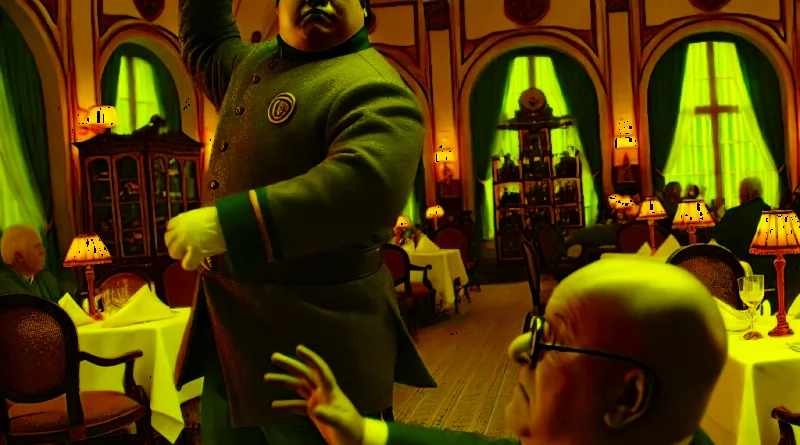Odd Job: A Life of Silence and Sacrifice
Odd Job’s life began far from the luxury and danger that would one day define him. His story started in a small, remote village in Norway, nestled deep within the fjords, where the snow-covered mountains overlooked the vast, icy waters. His parents, Lono and Kealani, were immigrants from Hawaii, having fled after the overthrow of the Hawaiian monarchy in 1893. Both had served as courtiers in the royal court of Queen Liliʻuokalani, advising the queen during the final days of the Hawaiian Kingdom. In addition to his court duties, Lono had also been the last Hawaiian Ambassador to the United Kingdoms of Sweden and Norway. So it was that when the kingdom fell, Lono and Kealani chose Norway as their place of refuge, a country they had already established ties with through Lono’s work.
Upon arriving in Norway, they adopted the surname Job—a simple, Norwegian-sounding name that helped them integrate into their new environment. For their son, born several years later, they chose the name Odd, a traditional Norwegian name derived from Old Norse, meaning “point of a weapon” or “sharp edge,” symbolizing strength.
Thus, Odd Job was born into this unique blend of Hawaiian heritage and Norwegian culture. Though the name might sound amusing to English speakers, in Norway, it was entirely normal, reflecting the strength and resilience of his family. The way “Odd Job” sounded in English was purely a coincidence—one that would later lead to great curiosity, but in his early life, it was simply a reflection of his new Norwegian identity.
From a young age, Odd Job was different. He towered over the local children, his build robust and powerful, and he had inherited his parents’ stoicism. He grew up with stories of the Hawaiian monarchy and the rich martial tradition of his ancestors, but his reality was one of snowstorms, fjords, and the humble life of immigrant survival. His size and quiet nature made him an outsider, but he never sought approval. He excelled in physical tasks—hiking the steep mountainsides, chopping wood, and working on local fishing boats—and learned the value of discipline and restraint. While others might boast or taunt, Odd Job kept to himself, watching and observing. He was a man of action, not words.
Bellhop in the Mountains
By the time Odd Job reached adulthood, he had carved out a niche for himself as a bellhop at a luxury hotel that catered to wealthy tourists, many of whom came for the breathtaking views and skiing. The hotel’s guests were often European aristocrats, industrialists, and other elites, and Odd Job quickly became the most reliable and sought-after bellhop, thanks to his immense strength and quiet efficiency.
One cold winter’s day, a wealthy and eccentric Englishman named Auric Goldfinger arrived at the hotel. He was a man of great power and wealth, with an air of superiority that made others uneasy. Goldfinger traveled with an entourage and numerous heavy bags, yet Odd Job handled the luggage with ease, immediately catching the businessman’s attention. Goldfinger noted Odd Job’s sheer physical presence but thought little more of it at the time.
That would change quickly.
Later that evening, while Goldfinger dined in the hotel’s lavish restaurant, a petty thief made the mistake of attempting to steal Goldfinger’s wallet from his coat pocket. The coat was hanging on a nearby rack, and the thief thought he could make a clean getaway. However, Odd Job, ever vigilant, had noticed the man’s suspicious behavior. Without a word, Odd Job acted. He pulled off his bellhop’s hat—a simple woolen cap with a heavy metal badge—and, with perfect accuracy, hurled it across the room. The hat struck the thief in the head, knocking him unconscious and sending the wallet to the floor.
Goldfinger, surprised and impressed, watched the scene unfold with fascination. Odd Job calmly retrieved the wallet, handed it back to Goldfinger, and bowed slightly before returning to his duties as if nothing had happened. It was at that moment that Goldfinger saw more than just a hotel employee—he saw an opportunity. Odd Job’s strength, precision, and silent demeanor made him the ideal bodyguard, someone who could be trusted implicitly.
Goldfinger wasted no time. He offered Odd Job a position as his personal bodyguard and assistant, an offer Odd Job accepted without hesitation. Goldfinger’s wealth and power were impossible to ignore, and the position promised not only travel and adventure but security for Odd Job’s family.
A Life of Silence and Service
In the years that followed, Odd Job became inseparable from Goldfinger. His loyalty was unmatched, and he served as both protector and enforcer. While Goldfinger thrived on manipulation and deception, Odd Job remained silent, his actions doing the speaking for him. He was not a man given to conversation or negotiation—he was a man of precision, deadly in his effectiveness.
The signature woolen hat was replaced with a custom-made steel-rimmed bowler hat, suggested by Goldfinger himself after seeing Odd Job’s skill. The hat became Odd Job’s lethal weapon of choice, a symbol of his quiet ruthlessness. His presence alone was enough to deter most threats, but when action was required, Odd Job delivered swift and unrelenting results.
Despite the violence and danger surrounding Goldfinger’s operations, Odd Job had a deep, personal motivation for remaining loyal. He understood that his work, though dark, was ensuring a future for his family. Goldfinger had promised him wealth beyond what Odd Job could have ever dreamed of, and this wealth would allow his family to live in comfort, something Odd Job had never experienced growing up.
The Fateful Final Mission
Odd Job’s final mission came at Fort Knox, where Goldfinger’s plan to detonate a nuclear bomb and contaminate the U.S. gold reserves would unfold. Odd Job, as always, followed Goldfinger without question, remaining calm as the chaos erupted around them. But something had shifted within him. Odd Job knew the risks of the operation and accepted that it would likely lead to his death. And yet, he pressed on without hesitation. Why?
Odd Job wasn’t acting out of blind loyalty to Goldfinger or a desire for personal glory. He knew that, should he perish, Goldfinger’s vast fortune would still ensure that his family could survive and prosper. Odd Job had seen the paperwork. He knew that his pension package was guaranteed, and the wealth it promised would change his family’s lives forever. His death was not a sacrifice in vain—it was a calculated move, one final act of devotion to his wife, children, and aging parents.
As Odd Job and James Bond faced off inside the Fort Knox vault, Odd Job’s strength and skill nearly overwhelmed Bond. But fate intervened. Bond managed to use Odd Job’s own weapon—the deadly bowler hat—against him, electrocuting Odd Job in a final moment of desperation. Odd Job died without a sound, his loyalty unbroken, his mission complete.
Epilogue: A Final Gift
The news of Odd Job’s death reached his family in Norway through an official phone call a few weeks after the events at Fort Knox. His wife, Inga, and their two children, along with his elderly parents, Lono and Kealani, gathered in stunned silence as the cold, formal words confirmed what they had feared: Odd Job had died while on a mission overseas. Though they had long known he lived a dangerous life, hearing the confirmation of his passing left a deep void in their hearts.
In the following days, life continued quietly in the small village. The family grieved in their own ways, but Odd Job had always been distant, his work shrouded in secrecy. They had few details of his life or death, which left many questions unanswered.
A few weeks later, a letter arrived. The envelope was plain, but the stamp in the corner was strange: “MI6 007 APPROVED”. The significance of it was lost on the family, who assumed it was just part of the bureaucratic process. They gathered around as Inga opened the envelope.
“Dear Mrs. Job and Family,
We regret to inform you that Odd Job has died while in service to Auric Goldfinger. While the circumstances are tragic, Auric Industries recognizes Odd Job’s many years of loyal service. As part of his pension package, please accept the enclosed check. We hope it will bring you some comfort during these difficult times.
Sincerely,
Auric Industries, Accounts Payable Division”
Beneath the letter was the check.
Inga stared in disbelief. The number printed on it seemed unreal. Several million U.S. dollars, enough to change their lives forever. Odd Job had never talked much about his earnings, and his family had never pressed him for details. Yet here it was: the final token of his work as Goldfinger’s silent protector.
For Lono and Kealani, the check meant something even more profound—it was their ticket home. After decades in Norway, they could finally return to Hawaii, the homeland they had once served as courtiers to the Hawaiian monarchy. The dream of spending their final years in Hawaii, on the islands they had left behind so long ago, could now become a reality.
In the months that followed, Odd Job’s family quietly sold their home in Norway and made the long journey to Hawaii. As they settled into their new life, the children would hear stories about their father—a man of few words but immeasurable strength. They would never know the full extent of his work or the lives he had taken, but they would always remember him as the man who, even in death, had secured their future.
Legacy of Loyalty
Odd Job’s life had been one of silence and service, shaped by his upbringing as a Hawaiian immigrant in the cold mountains of Norway. Though his loyalty to Goldfinger had been absolute, it was his loyalty to his family that ultimately drove him. His final act—facing certain death inside the vault with the nuclear bomb—wasn’t just an act of fanaticism; it was the ultimate sacrifice to ensure his family’s future.
Odd Job would be remembered not as just a henchman, but as a man who played the cards life dealt him to protect those he loved. His family, now living in the warm embrace of Hawaii, would carry his legacy, knowing that behind the silent mask of strength and violence lay the heart of a father and son who had done everything for them.

